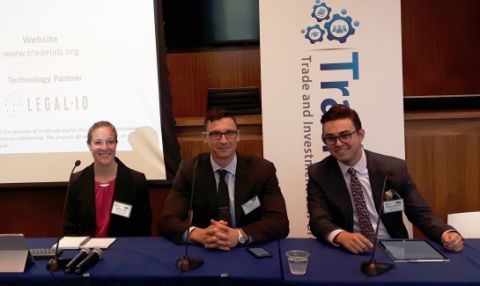
From Kingston, Queen’s Law students have made their mark on trade law beneficiaries as far away as Tanzania and Switzerland, as well as closer to home in Ottawa and Washington, D.C.
How did they do this? They were students in the first International Trade Law Practicum taught by Professors Nicolas Lamp and Valerie Hughes, a fantastic boost to experiential learning offerings at Queen’s Law.
“The practicum gives students an opportunity to research real trade law questions and do work for real beneficiaries and thereby significantly deepen their international trade law knowledge and expertise,” Hughes explains. Hughes most recently served as the Director of the Legal Affairs Division at the World Trade Organization and she is known to Queen’s Law students as an instructor in the International Law Programs at Herstmonceux Castle.
The first cohort of students in the practicum completed projects for beneficiaries that included the East African Community Secretariat in Tanzania, Conservation International (an NGO based in Washington, D.C.), the International Trade Centre (an international organization based in Geneva), and two trade divisions in Global Affairs Canada. Fifteen students worked in teams of three.
Queen’s offers the practicum jointly with the University of Ottawa as part of TradeLab, a network of seven legal clinics located across the world where students learn by doing projects with the goal of making global trade agreements work for everyone, especially for governments in developing countries, small- and medium-sized enterprises and non-governmental organizations.
Queen’s Law students have been recognized for their efforts. “We now have a great set of case studies on how countries are empowering women economically,” says Arancha González, the Executive Director of the International Trade Centre, thanking the practicum students for helping her organization “convert knowledge to action.” Their project focused on enhancing female entrepreneurs’ participation in public procurement.
In July, another team of students – Tristan McLeod, Law’19, Isabella Mira, Law’19, and Blake Van Santen, Law’18 – presented their project on trade facilitation in Washington at TradeLab’s annual meeting and the Society of International Economic Law Conference.
In a video message, the trio encourage students to apply. “If you are interested in international trade or think you might be, we highly recommend the International Trade Law Practicum,” Van Santen says.
“It’s a unique course that is most akin to actually working in international trade law,” explains Lamp. “Students work on actual problems these stakeholders face.”
“Students also learn highly practical skills that one does not learn in a traditional trade law class, such as how to manage a big project under difficult time constraints, how to work as a member of a team, and how to manage a beneficiary who may be rather demanding,” adds Hughes.
Lamp finds it satisfying to see how student work evolves over the term thanks to continuous revision of the product. Compared to a traditional class, it is “a different way of working with your professors” and “the feedback is very frank,” but the comments are in the same vein as those students would receive from senior lawyers in practice. Clearly, students who complete the Trade Law Practicum will be better prepared for future employment and potential employers will no doubt be impressed by the knowledge and experience they can bring to their work.
When asked about what’s next for the practicum, Lamp mentions the Faculty’s call for a Queen’s National Scholar in International Economic Law, which should allow the Trade Law Practicum to accept more students and to accept beneficiary work on international investment law.
Before that, next year’s class already has more projects lined up from the Trade Law Bureau at Global Affairs Canada and the East African Community Secretariat. Professors Lamp and Hughes are also exploring whether practicum students could help local Indigenous groups address issues that they face in cross-border and interprovincial trade. The next group of students will get to work in January 2019.